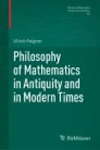- About MAA
- Membership
- MAA Publications
- Periodicals
- Blogs
- MAA Book Series
- MAA Press (an imprint of the AMS)
- MAA Notes
- MAA Reviews
- Mathematical Communication
- Information for Libraries
- Author Resources
- Advertise with MAA
- Meetings
- Competitions
- Programs
- Communities
- MAA Sections
- SIGMAA
- MAA Connect
- Students
- MAA Awards
- Awards Booklets
- Writing Awards
- Teaching Awards
- Service Awards
- Research Awards
- Lecture Awards
- Putnam Competition Individual and Team Winners
- D. E. Shaw Group AMC 8 Awards & Certificates
- Maryam Mirzakhani AMC 10 A Awards & Certificates
- Two Sigma AMC 10 B Awards & Certificates
- Jane Street AMC 12 A Awards & Certificates
- Akamai AMC 12 B Awards & Certificates
- High School Teachers
- News
You are here
Philosophy of Mathematics in Antiquity and in Modern Times

Publisher:
Birkhäuser
Publication Date:
2023
Number of Pages:
328
Format:
Hardcover
Series:
Science Networks Historical Studies
Price:
139.99
ISBN:
978-3031273032
Category:
Monograph
[Reviewed by , on ]
Frederic Morneau-Guérin
02/29/2024
This book was written by a mathematician and is intended for mathematicians (albeit in training). Yet there can be no doubt that its subject falls within the scope of philosophy. In just over 300 pages, the author, Ulrich Felgner, takes us on a tour of the main philosophical conceptions of the mode of existence of mathematical objects, tracing their origins from antiquity to the present day. In the process, we delve into the thinking of some twenty philosophers and mathematicians who have endeavored to find answers to the above question, while also glimpsing the contributions of several dozen other thinkers (all listed in an eight-page index of names).
The present work is a revised, expanded and translated edition of Philosophie der Mathematik in der Antike und in der Neuzeit (2020), itself adapted from lecture notes written and collated by the author between 1980 and the early 2010s. Quite dense, it represents a demanding but captivating read, in the course of which the student of mathematics will be guided considerably deeper into philosophical territory than he would otherwise have the opportunity to venture by going through the standard core syllabus of the bachelor's degree in mathematics. While it does contain a few theorems followed by proofs, certain mathematical symbols and a few formulae, this book should not put off philosophy students interested in mathematics. As for the specialist, he or she will not find anything original in this introductory work, but should nevertheless enjoy reading it.
The book is divided into three parts of equal size, themselves subdivided into 6 to 8 chapters interspersed with quotations (accompanied by the original text), each focusing on the thought of a philosopher (e.g. Locke's or Kant's conception of mathematics), a philosophical movement or tradition (e.g. logicism or empiricism) or a specific theme (e.g. the axiomatic method or the question of certainty in mathematics). Each chapter ends with a short list of relatively recent secondary references.
The first part deals with the philosophy of mathematics in Greek antiquity. The work of Plato, Aristotle and Euclid is the main focus, but the contribution of many other lesser-known philosophers such as Eudoxux of Cnidus, Hippasus of Metapontum and Zeno of Elea is also discussed.
The second part deals with advances in the philosophy of mathematics in the 16th, 17th and 18th centuries. It looks successively at the thought of Renée Descartes, John Locke, rationalists such as Blaise Pascal, Gottfried Wilhelm Leibniz and Ehrenfried Walther von Tschirnhaus, empiricists such as George Berkeley, David Hume and John Stuart Mill, and finally Immanuel Kant.
The third part, which is more fragmented, presents the developments of the 19th and 20th centuries. These include the work of thinkers belonging to philosophical currents such as psychologism, logicism, neoplatonism, formalism, structuralism, constructivism and finitism.
The structure we have just described suggests that late antiquity and the Middle Ages disappear into the author's blind spot. This is only partly true. Although there is in fact no section or chapter dealing specifically with this period of history, Felgner does not fail to touch (briefly) on the contribution of a handful of key figures in medieval philosophy such as Boethius and John Buridan.
All in all, the author does a remarkable job of outlining the thought of each philosopher under consideration, describing its ramifications, bringing out its subtleties (usually by going back to the original text) and, lastly, contrasting it with that of other thinkers. Interestingly, he does not shy away from the main strands usually explored in courses on the history of mathematics or mathematical logic.
Frederic Morneau-Guérin is a professor in the Department of Education at Université TELUQ. He holds a Ph.D. in abstract harmonic analysis.
Frederic Morneau-Guérin is a professor in the Department of Education at Université TELUQ. He holds a Ph.D. in abstract harmonic analysis.
See the publisher's website.
- Log in to post comments




